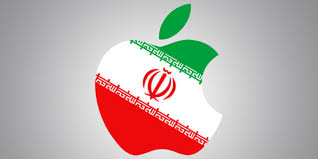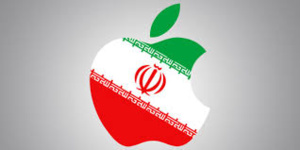His application, AloPeyk, a delivery service in Tehran, had been removed due to sanctions put in place by the U.S. government, Iranian entrepreneur Mehdi Nayebi received an email from Apple Inc.’s App Store Review stating this on a Saturday in mid-August.
There are also others. According to Nayebi, and Delion’s co-founder Mahdi Taghizadeh, also similarly removed were Iran-focused apps ride-hailing app Snapp, online store Digikala, Bamilo, an e-commerce marketplace, and Delion Foods, a meals delivery startup, among about a dozen other such apps.
“We got removed from App Store overnight, without any sort of warning,” Nayebi said. “We had just published a new version with enormous improvements. When users woke up the next morning, they saw the app is not available anymore.”
According to Nayebi, citing trade sanctions enforced by the U.S. Office of Foreign Assets Control, he received an email from Apple even as AloPeyk tried to appeal the decision.
Users cannot download or update from the App Store even though they can still access the apps on their phones. Circumventing the removal, to create a version for the iPhone’s web browser that would function similarly to an app were scrambled to be put together by Nayebi’s team.
“Under the U.S. sanctions regulations, the App Store cannot host, distribute, or do business with apps or developers connected to certain U.S. embargoed countries,” Apple said in its email to developers. “This area of law is complex and constantly changing. If the existing restrictions shift, we encourage you to resubmit your app for inclusion on the App Store.” An Apple no further comment on the matter after a spokesman confirmed the authenticity of the email.
If he obtains a letter from the U.S. Office of Foreign Assets Control confirming the release of the app from the U.S.’s restrictions, the iPhone maker would re-consider his app, a follow-up email from Apple to Nayebi stated. There were no response from Digikala, Bamilo and Snapp.
As Apple becomes more of a digital services and content provider, rather than just a designer of high-end consumer gadgets, this is the latest example of new challenges Apple faces.
The company’s services business is Apple’s second-largest unit behind the iPhone and has increased about 22 percent in the past year, and includes its App Store and iTunes music and video offerings. Distributing more information online means more clashes with governments even though that’s attractive to investors.
Another government-forced app removal situation was faced by App Store in July. Removed from Apple’s China App Store at the request of the Chinese government was virtual private networks applications, programs designed to circumvent internet restrictions. “We have been required to remove some VPN apps in China that do not meet the new regulations,” Apple said at the time.
While some U.S. trade and banking sanctions remain, hindering business, following its 2015 agreement with world powers, Iran’s nuclear-related sanctions were lifted last year. The U.S. under President Donald Trump has pushed for more sanctions against Iran, even though the deal was seen as a milestone for Iran to join international markets and open its doors to foreign investment and technology. The deal was reached under the Obama administration.
“Companies incur costs to research, design and develop apps for Android and Apple phones,” said Mohammadreza Azali, chief executive officer of TechRasa, a Tehran-based startup and tech news website. “If their app is removed from Apple devices it means that half of the cost they have incurred is gone with the wind.”
“It’s also a hit in terms of business,” he added. “There is an estimated 7 million iPhone holders in the country and their purchasing power is considered as being higher than those of Android users and they have readiness to buy. It’s a problem if you can’t access that clientele.”
“We’re trying to raise our voice in international media,” Taghizadeh said. “We don’t have such issues with Android ecosystem,” referring to Google’s App Store. Taghizadeh, along with at least four others, have started a petition online. They are asking Apple’s Chief Executive Officer Tim Cook to help lift the ban.
(Source:www.bloomberg.com)
There are also others. According to Nayebi, and Delion’s co-founder Mahdi Taghizadeh, also similarly removed were Iran-focused apps ride-hailing app Snapp, online store Digikala, Bamilo, an e-commerce marketplace, and Delion Foods, a meals delivery startup, among about a dozen other such apps.
“We got removed from App Store overnight, without any sort of warning,” Nayebi said. “We had just published a new version with enormous improvements. When users woke up the next morning, they saw the app is not available anymore.”
According to Nayebi, citing trade sanctions enforced by the U.S. Office of Foreign Assets Control, he received an email from Apple even as AloPeyk tried to appeal the decision.
Users cannot download or update from the App Store even though they can still access the apps on their phones. Circumventing the removal, to create a version for the iPhone’s web browser that would function similarly to an app were scrambled to be put together by Nayebi’s team.
“Under the U.S. sanctions regulations, the App Store cannot host, distribute, or do business with apps or developers connected to certain U.S. embargoed countries,” Apple said in its email to developers. “This area of law is complex and constantly changing. If the existing restrictions shift, we encourage you to resubmit your app for inclusion on the App Store.” An Apple no further comment on the matter after a spokesman confirmed the authenticity of the email.
If he obtains a letter from the U.S. Office of Foreign Assets Control confirming the release of the app from the U.S.’s restrictions, the iPhone maker would re-consider his app, a follow-up email from Apple to Nayebi stated. There were no response from Digikala, Bamilo and Snapp.
As Apple becomes more of a digital services and content provider, rather than just a designer of high-end consumer gadgets, this is the latest example of new challenges Apple faces.
The company’s services business is Apple’s second-largest unit behind the iPhone and has increased about 22 percent in the past year, and includes its App Store and iTunes music and video offerings. Distributing more information online means more clashes with governments even though that’s attractive to investors.
Another government-forced app removal situation was faced by App Store in July. Removed from Apple’s China App Store at the request of the Chinese government was virtual private networks applications, programs designed to circumvent internet restrictions. “We have been required to remove some VPN apps in China that do not meet the new regulations,” Apple said at the time.
While some U.S. trade and banking sanctions remain, hindering business, following its 2015 agreement with world powers, Iran’s nuclear-related sanctions were lifted last year. The U.S. under President Donald Trump has pushed for more sanctions against Iran, even though the deal was seen as a milestone for Iran to join international markets and open its doors to foreign investment and technology. The deal was reached under the Obama administration.
“Companies incur costs to research, design and develop apps for Android and Apple phones,” said Mohammadreza Azali, chief executive officer of TechRasa, a Tehran-based startup and tech news website. “If their app is removed from Apple devices it means that half of the cost they have incurred is gone with the wind.”
“It’s also a hit in terms of business,” he added. “There is an estimated 7 million iPhone holders in the country and their purchasing power is considered as being higher than those of Android users and they have readiness to buy. It’s a problem if you can’t access that clientele.”
“We’re trying to raise our voice in international media,” Taghizadeh said. “We don’t have such issues with Android ecosystem,” referring to Google’s App Store. Taghizadeh, along with at least four others, have started a petition online. They are asking Apple’s Chief Executive Officer Tim Cook to help lift the ban.
(Source:www.bloomberg.com)






